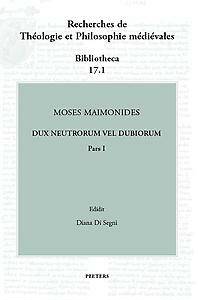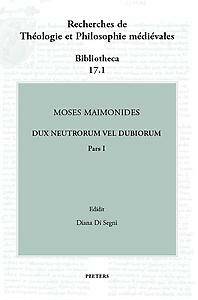
- Afhalen na 1 uur in een winkel met voorraad
- Gratis thuislevering in België vanaf € 30
- Ruim aanbod met 7 miljoen producten
- Afhalen na 1 uur in een winkel met voorraad
- Gratis thuislevering in België vanaf € 30
- Ruim aanbod met 7 miljoen producten
Zoeken
Omschrijving
Moses Maimonides' Guide of the Perplexed - often considered the masterpiece of medieval Jewish philosophy - was originally composed in Arabic between 1185 and 1190-1191. It was translated twice into Hebrew, with the title Moreh nevukim, and from Hebrew into Latin. This complete translation, entitled Dux neutrorum, began to circulate during the 13th century. The Latin version proceeded to be widely received and highly influential: prominent authors such as Albert the Great, Thomas Aquinas, and Meister Eckhart often referred to the authority of Rabbi Moyses. Nevertheless, the Dux neutrorum has until now been accessible only through a 16th century printed edition. The critical edition of the Dux neutrorum, presented here for the first time, fulfills a long-standing desideratum of the field. The edition is based on an examination of the entire manuscript tradition and is accompanied by a substantial historical and philological introduction.
Specificaties
Betrokkenen
- Auteur(s):
- Uitgeverij:
Inhoud
- Aantal bladzijden:
- 534
- Taal:
- Engels
- Reeks:
Eigenschappen
- Productcode (EAN):
- 9789042940901
- Verschijningsdatum:
- 29/10/2019
- Uitvoering:
- Hardcover
- Formaat:
- Genaaid
- Afmetingen:
- 163 mm x 241 mm
- Gewicht:
- 952 g

Alleen bij Standaard Boekhandel
+ 188 punten op je klantenkaart van Standaard Boekhandel
Beoordelingen
We publiceren alleen reviews die voldoen aan de voorwaarden voor reviews. Bekijk onze voorwaarden voor reviews.











